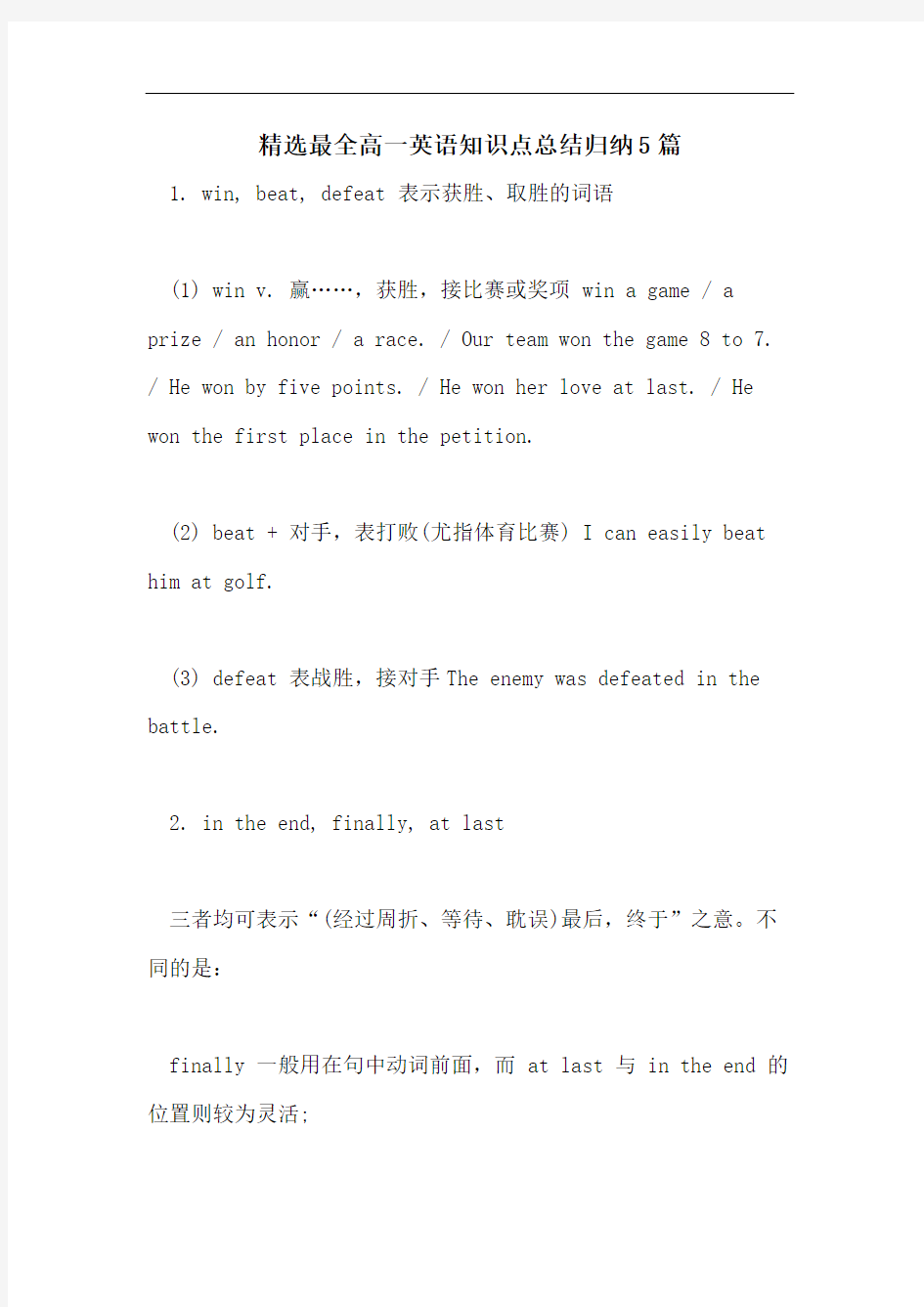精选最全高一英语知识点总结归纳5篇

- 1、下载文档前请自行甄别文档内容的完整性,平台不提供额外的编辑、内容补充、找答案等附加服务。
- 2、"仅部分预览"的文档,不可在线预览部分如存在完整性等问题,可反馈申请退款(可完整预览的文档不适用该条件!)。
- 3、如文档侵犯您的权益,请联系客服反馈,我们会尽快为您处理(人工客服工作时间:9:00-18:30)。
精选最全高一英语知识点总结归纳5篇
1. win, beat, defeat 表示获胜、取胜的词语
(1) win v. 赢……,获胜,接比赛或奖项 win a game / a prize / an honor / a race. / Our team won the game 8 to 7. / He won by five points. / He won her love at last. / He won the first place in the petition.
(2) beat + 对手,表打败(尤指体育比赛) I can easily beat him at golf.
(3) defeat 表战胜,接对手The enemy was defeated in the battle.
2. in the end, finally, at last
三者均可表示“(经过周折、等待、耽误)最后,终于”之意。不同的是:
finally 一般用在句中动词前面,而 at last 与 in the end 的位置则较为灵活;
三者中at last 语气最为强烈,且可单独作为感叹句使用。
After putting it off three times, we finally managed to have a holiday in Dalian. / At last he knew the meaning of life. / At last! Where on earth have you been? / But in the end he gave in.
另外,finally还可用在列举事项时,引出最后一个内容,相当
于lastly。 Firstly, we should make a plan; secondly, we should carry it out; finally we should make a conclu- sion.
3. by sea, by the sea, in the sea, on the sea, at sea
(1) by sea “走海路,乘船”,用来表示交通方式,同 by ship 同义。 These heavy boxes should be sent by sea.
(2) by the sea “在海边”,相当于 by (at) the seaside。The children enjoyed themselves by the sea on Children's Day.
(3) in the sea “在海里,在海水中” There are many plants and animals in the sea.
(4) on the sea “在海面上”,“在海岸边”。I want to live in a town with a beautiful position on the sea.
(5) at sea 在海上;在航海 When he woke up, the ship was at sea.
4. be afraid, be afraid to do sth., be afraid of (doing) sth.
(1) be afraid 意为“担心,害怕”,多用于口语,常用来表示一种歉意,或遗憾,后可接 so 或 not,也可接 that 从句。I'm afraid (that) 其语意相当于 I'm sorry, but...。
-- Are we on time? 我们准时吗? -- I'm afraid not. 恐怕不准时。I'm afraid you'll get caught in the rain.
(2) be afraid to do sth 常表示“由于胆小而不敢做某事”。She is afraid to be here alone. / He is afraid to jump into the river from the bridge.
(3) be afraid of (doing) sth. 常表示“担心或害怕某事(发生)”。I was afraid of hurting her feelings.
5. live, living, alive, lively
(1) live adj.
①活的;活生生的;(只修饰生物;只作前置定语) The laboratory is doing experiments with several live monkeys.
②实况直播的 (不是录音)It wasn't a recorded show. It was live.
③带电的;燃着的;可爆炸的 This is a live wire.
(2) living adj. 活着的,有生命的(作表语或定语) She was, he thought, the best living novelist in England. / The old man is still living. (或alive)
(3) alive adj. ①活着的;②有活力的;有生气
作后置定语:Who's the greatest man alive?
作表语:Was the snake alive or dead? / My grandmother is more alive than a lot of young people.
作补语:Let's keep the fish alive.
(4) lively adj. 活泼的;有生气的;活跃的(作表语或定语) The music is bright and lively.
raise vt.“使……上升;升起;提高”等;
rise vi.“上升;升起”;
arise vi.“站起来(stand up)”,“起床(get up)”
rise和arise用作站起,起床都属正式用法;arise主要表示“出现、发生”等意思。
She raised her voice in anger. (抬高)
The wind raised the fallen leaves from the ground. (刮起)
